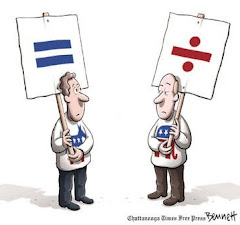It was a coincidence. On Thursday I stumbled across a television program devoted to the life of Nathaniel S. Colley, Sr. The name was familiar to me, since I had heard it many times during my stint in state service. Colley was an attorney and civil rights leader in Sacramento, known to all of the state capital's elected officials and public servants. The biographical program on Sacramento's KVIE devoted a significant amount of time to Colley's vigorous endorsement of his McGeorge Law School colleague Anthony Kennedy for the U.S. Supreme Court.
“I am here because I know Judge Kennedy well. He is a man of great integrity who has a sincere devotion to the rule of law.” —Nathaniel Colley, December 1987On Friday I picked up a copy of that morning's San Francisco Chronicle and a headline caught my eye:
Proposition 8 foes seek sweeping high-court rulingThe newspaper reported that attorneys for the plaintiffs would argue for a Supreme Court decision that would quash not only Proposition 8, but all similar bans against same-sex marriage. Such a ruling would have the effect of extending gay marriage throughout the United States, much as Lawrence v. Texas invalidated all of the state laws against so-called sodomy (however defined) and same-sex relations.
“The petitioners are entitled to respect for their private lives. The State cannot demean their existence or control their destiny by making their private sexual conduct a crime.”
Lawrence v. Texas majority opinion
Justice Anthony Kennedy, June 2003
“Several witnesses attested to this evolution and to Judge Kennedy's open-mindedness, and to the fact that his development process is continuing. He is a grown man who will grow more, said Nathaniel Colley.”Justice Kennedy is today the high court's most famous “swing vote.” With the notable exception of the Obamacare decision, where it was Chief Justice Roberts who cast the deciding vote, most observers agree that as Kennedy goes, so goes the Supreme Court. Naturally, therefore, all eyes are on the author of the Lawrence v. Texas decision. Will Justice Kennedy seize upon the Proposition 8 case as a new opportunity for growth, or will he continue his recent trend of aligning with the court's conservative bloc?
Hearings before the Committee on the Judiciary
United State SenateOne Hundredth Congress
December 1987
Many people are pessimistic. Kennedy has not inspired much confidence. My fingers, however, are figuratively crossed. Justice Scalia is an intemperate bully who has roundly abused his colleagues when they disagree with him. Kennedy has no reason to embrace Scalia's position to preserve a collegiality that is nonexistent. He can do as he pleases.
Will it please him to strike down Proposition 8? And, if he does, will he dispatch it with a stiletto or a saber? If Kennedy is thinking in terms of his judicial legacy, he must certainly be aware that cases decided on narrowly-construed grounds with limited impact do not make for key chapters in the history books. If he ducks the matter with a convenient technicality, he will have squandered a golden opportunity to leave his mark on the Golden State and beyond. The author of Lawrence could burnish his reputation as a milestone jurist with a simple and straightforward ruling in Hollingsworth that Proposition 8 and all measures like it are unconstitutional on equal-rights grounds.
In this context it might be appropriate to recall Anthony Kennedy's tenure at McGeorge School of Law. The longtime dean was a gay man, as was one of the dean's best friends, a closeted actor who was among the law school's most significant benefactors when he wasn't playing a lawyer on TV. Kennedy should keep these friends and colleagues in mind as he decides the Proposition 8 case. He could strike another blow for the advancement of civil rights. He could confirm Nathaniel Colley's judgment that he is a man who grows.
And he could give Scalia apoplexy.


















